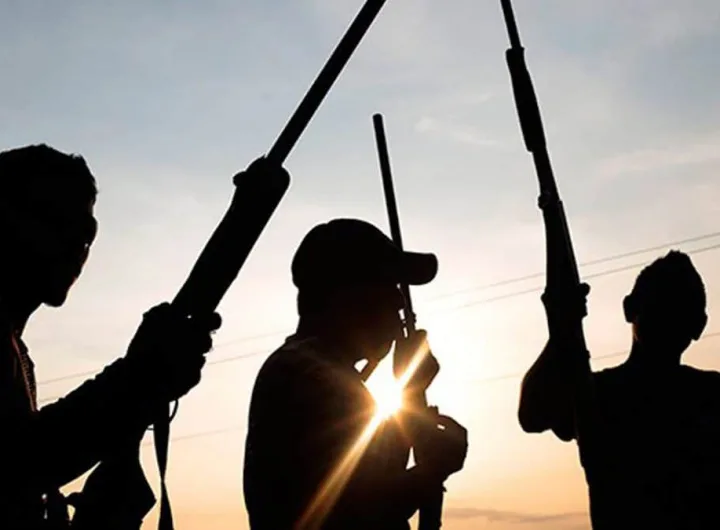
President Andry Rajoelina condemned CAPSAT for siding with protesters/Getty
Following weeks of demonstrations against the government, President Andry Rajoelina has allegedly departed Madagascar, just hours before a scheduled national address on state television.
An opposition member of parliament in the Indian Ocean nation stated Monday that Madagascar’s President, Andry Rajoelina, has exited the country following an elite military unit’s defection to the opposition in what appears to be a coup attempt.
This statement emerged just before Rajoelina’s planned appearance on national television to deliver an address to Madagascar’s citizens.
The president’s office announced that his address would air on state television and radio at 7 p.m. local time (1600 GMT) but provided no confirmation of whether the president remained in Madagascar following reports of his departure amid weeks of fatal anti-government demonstrations.
These demonstrations, originally organized by youth movements, took a critical turn on Saturday when members of the elite CAPSAT military unit marched alongside protesters to a plaza in Antananarivo, the capital, demanding that Rajoelina and multiple government ministers step down.

CAPSAT, the unit that facilitated Rajoelina’s initial rise to power as transitional leader through a military-supported coup in 2009, announced it had assumed control of Madagascar’s entire armed forces.
Opposition parliamentary leader Siteny Randrianasoloniaiko stated that Rajoelina “ran away” from Madagascar on Sunday following the military’s betrayal.
Rajoelina’s Location Unknown
On Sunday, Rajoelina’s office declared that “an attempt to seize power illegally and by force” was taking place in the nation of 31 million located off Africa’s eastern coastline.
The president’s current location remains unknown, and his spokesperson has not answered phone calls or messages.
French state radio RFI reported that Rajoelina was evacuated on a French military plane after agreeing a deal with President Macron.
The French Embassy in Antananarivo released a statement clarifying that “no French military intervention is underway or planned in Madagascar, whose sovereignty and territorial integrity France fully respects.”
Madagascar was previously under French colonial rule, and Rajoelina reportedly holds French citizenship, an issue that has caused resentment among Madagascar’s population in the past.
Elite Military Force
While Rajoelina hasn’t specified who orchestrated the attempted coup, CAPSAT appeared to hold authority and on Sunday designated a general as Madagascar’s new armed forces chief, a decision the defense minister approved.
Colonel Michael Randrianirina, a CAPSAT commander, reported that his troops engaged in gunfire with security forces trying to suppress weekend demonstrations, resulting in one soldier’s death.
However, no significant street fighting occurred, and troops traveling on armored vehicles while displaying Madagascar flags received cheers from residents in Antananarivo.
Randrianirina stated that the army had “responded to the people’s calls,” but denied there was a coup.
At the country’s military headquarters on Sunday, he informed reporters that the Madagascan people would determine the next steps, including whether Rajoelina relinquishes power and whether new elections take place.
The US Embassy in Madagascar recommended that American citizens shelter in place due to a “highly volatile and unpredictable” situation. The African Union called on all parties, “both civilian and military, to exercise calm and restraint.”
Weeks of Demonstrations
Three weeks of the most substantial civil unrest in years have rocked Madagascar. The anti-government demonstrations, which began on Sept. 25 due to water and electricity service disruptions, were spearheaded by a group identifying as “Gen Z Madagascar.”
According to the United Nations, the protests resulted in at least 22 fatalities and numerous injuries. The government contests this figure.
The demonstrations expanded into broader dissatisfaction with governmental leadership under Rajoelina.

Protesters have highlighted various concerns, including economic hardship and living expenses, access to higher education, and accusations of corruption and misappropriation of public resources by government officials along with their relatives and associates.
Civil society organizations and labor unions have also participated in the protests, leading to nighttime curfews in Antananarivo and other major urban areas. These curfews remained active in Antananarivo and the northern coastal city of Antsiranana.
The Gen Z demonstrators who sparked the movement have organized through online platforms and cite inspiration from other protests that removed governments in Nepal and Sri Lanka.
Legacy of Political Turmoil
Since achieving independence from France in 1960, Madagascar has experienced multiple leaders overthrown through coups and maintains a record of political instability.
Rajoelina, 51, initially gained prominence as head of a transitional government after a 2009 coup that compelled then-President Marc Ravalomanana to escape the country and forfeit power.
Rajoelina won the presidency in 2018 and secured reelection in 2023 during an election that opposition parties boycotted.

 Tiwa Savage Launches Foundation To Support African Music Creatives
Tiwa Savage Launches Foundation To Support African Music Creatives  Gunmen Kidnap Six Church Members In Ondo State
Gunmen Kidnap Six Church Members In Ondo State  Violence Grips Mexico Following Death Of Drug Lord “El Mencho”
Violence Grips Mexico Following Death Of Drug Lord “El Mencho”  Netherlands Swears In First Openly Gay Prime Minister
Netherlands Swears In First Openly Gay Prime Minister  US Military Aircraft Land In Nigeria With Troops
US Military Aircraft Land In Nigeria With Troops  Tems Becomes First African Woman To Break Billboard Record
Tems Becomes First African Woman To Break Billboard Record